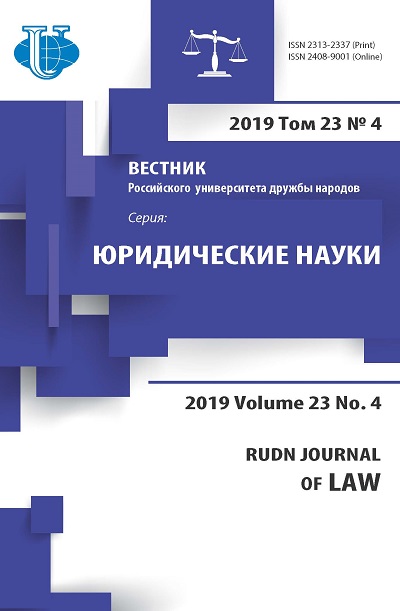INTEGRATION AS AN OBJECT OF RESEARCH OF LEGAL SCIENCES
- Authors: Rafalyuk E.E.1
-
Affiliations:
- The Secretariat of the Court of the Eurasian Economic Union
- Issue: Vol 23, No 4 (2019)
- Pages: 490-509
- Section: STATE AND LAW IN CONTEMPORARY WORLD
- URL: https://journals.rudn.ru/law/article/view/22495
- DOI: https://doi.org/10.22363/2313-2337-2019-23-4-490-509
- ID: 22495
Cite item
Full Text
Abstract
The solution of both theoretical and practical problems related to the legal support of integration processes determines the relevance of the search for appropriate methodological approaches to the study of this problem. Reference to the problems of methodology of studying the legal nature and law of integration of interstate associations is important, as there is still no uniformity in the theoretical interpretation and methods of research of legal integration. The purpose of this article is to consider the possibilities of application of interdisciplinary, multidisciplinary, transdisciplinary (system) approaches to the study of certain problems related to the legal support of integration. The analysis of the chosen problems is based on the provisions of domestic and foreign scientific works devoted to the problems of the methodology of jurisprudence. As a result of the research, the author comes to the conclusion that in the conditions of the global world complex objects of reality, which also include integration, can not be cognizable within one scientific discipline, which is a significant argument in favor of referring to interdisciplinary, multidisciplinary and systemic methodology. The choice of the appropriate methodological approach to the study of integration depends on: the essence and characteristics of the object of study; the objectives of the study; the purpose of the study. No less important aspect in the study of integration is the appeal to the axiological aspects of integration processes, and therefore, the study of various aspects of regional economic integration, for example, cultural, sociological, psychological, aimed at the study of values and goals of integration, the state of society, the role of man in the integration process.
About the authors
Elena E. Rafalyuk
The Secretariat of the Court of the Eurasian Economic Union
Author for correspondence.
Email: rafaliuk_e@mail.ru
Candidate of Legal Sciences, Counsel of the expert-analytical Department
5, Kirova str., 220006, Minsk, Republic of BelarusReferences
- Bottomore, T.B. (1983) Introducción en Interdisciplinariedad y Ciencias Humanas, trad. de J.G. Péres Martín. Madrid, Tecnos UNESCO. (in Spanish).
- Calvo García, M. (1994) Los fundamentos del método jurídico: una revisión crítica. Madrid. Editorial: Tecnos. (in Spanish).
- Díez Sastre, S. (2018) La formación de conceptos en el derecho public. Un estudio de metodología académica: definición, funciones y criterios de formación de los conceptos jurídicos. Madrid. Editorial: Marcial Pons, Ediciones Jurídicas y Sociales. (in Spanish).
- Decision of the judicial bench of the EAEU Court dated December 21, 2018, available at: http://courteurasian.org/page-25501; Decision of the judicial bench of the EAEU Court dated June 18, 2019 // http://courteurasian.org/page-26361 (Accessed 16 September 2019).
- Advisory opinion of the EAEU Court dated April 4, 2017, available at: http://courteurasian.org/page24731; Advisory opinion of the EAEU Court dated December 17, 2018, available at: http://courteurasian.org/page-25501; Advisory opinion of the EAEU Court dated June 18, 2019, available at: http://courteurasian.org/page-26361 (Accessed 16 September 2019).
- Falcón y Tella, Mª J. (2014) La justicia como mérito. Monografías Jurídicas. Ediciones Jurídicas y Sociales. Madrid. Editorial: Marcial Pons. (in Spanish).
- Grigorjan, K.G. (2012) Integrated approach to the assessment of the state and prospects of development of regional integration associations (on the example of the Association of Southeast Asian countries). Avtoref. dis. … kand. ekon. nauk [Abstract of PhD in economics]. Moscow: FGBOU VPO «Gosudarstvennyi universitet upravleniya» Publ. (in Russian).
- Ibánez Jiménez, J.W. (2011) Análisis económico del Derecho: método, investigación y práctica jurídica. Barcelona, Bosch: JMB. (in Spanish).
- Jiménez Piernas, C. (1995) El método del derecho internacional público: una aproximación sistémica y transdisciplinar. Editor: Universidad Carlos III de Madrid. Instituto de Estudios Internacionales y Europeos Francisco de Vitoria. Madrid, Tecnos. (in Spanish).
- Kerimov, D.A. (2003) Metodologiya prava. Predmet, funktsii, problemy filosofii prava [Methodology of law. Subject, functions, problems of philosophy of law]. Moscow: Modern humanitarian University Publ. (in Russian).
- Kimelev, Ju.A. (2011) Metodologiya sotsial'nykh nauk: (Sovremennye diskussii): Analiticheskii obzor [The Methodology of social Sciences (Contemporary debate): an Analytical review]. RAN. INION. Centr gumanit. scientific.-inform. research. depart. philosophy; ed. by Khlebnikov, G.V. Moscow: INION RAN Publ. (in Russian).
- Kutyeva, Je.R. (2005) Evraziistvo kak yavlenie kul'tury XX veka. Istoriografiya i metodologiya issledovaniya [Eurasianism as a phenomenon of culture of the XX century. Historiography and research methodology] Avtoref. dis. … kand. kul'turologii [Abstract of PhD in cultural studies]. Saint-Petersburg. Publishing house “LEMA” Publ. (in Russian).
- Larenz, K. (1994) Metodología de la ciencia del derecho. Barcelona, Ariel Derecho. Editorial: Editorial Ariel. (in Spanish).
- Malahov, V.P. (2018) Metodologicheskie i mirovozzrencheskie problemy sovremennoi yuridicheskoi teorii: monografija [Methodological and ideological problems of modern legal theory: monograph]. Malahov V.P., Jeriashvili N.D. (eds.). Moscow: JUNITI-DANA: Legislation and law Publ. (in Russian).
- Rodriguez Lozano, L.G., Zaragoza Huerta, J. (2012) La investigación del derecho y la ética. In: Metodología para investigaciones del alto impacto en las ciencias sociales. Madrid, Universidad Autónoma de Nueva León, Universidad Rey Juan Carlos. (in Spanish).
- Vallet de Goytisolo, J. (2004) Manuales de metodología jurídica. Madrid. Editorial: Fundación Cultural del Notariado. (in Spanish).
Supplementary files















